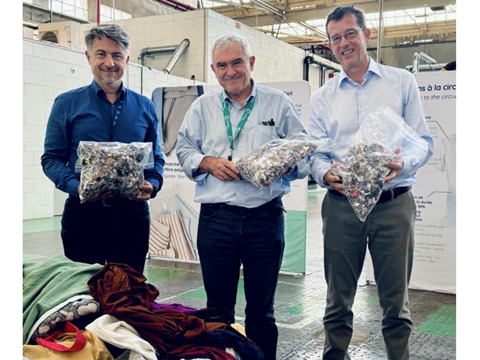
CARBIOS and Nouvelles Fibres Textiles have signed a Memorandum of Understanding to establish a contract for the supply of polyester textiles to the ‘world’s first’ PET biorecycling plant currently under construction in Longlaville, France, hoping to enable 5,000 tonnes a year of textiles to be redirected towards biorecycling from 2026 onwards.
The companies say the polyester textiles supplied will come from used or end-of-life textiles prepared for recycling by Nouvelles Fibres Textiles in France, using CARBIOS’ enzymatic depolymerization technology. The contract hopes to enable 5,000 tonnes a year of these textiles to be redirected towards biorecycling from 2026 onwards, over an initial 5-year period.
Nouvelles Fibres Textiles and its various partners opened a semi-industrial site with an annual capacity of 1,000 tonnes in November 2023, with the aim to build a 20,000-to-30,000-tonne unit in 2026. The first site, a research centre for textile recycling, combines the knowledge of Andritz Laroche, Pellenc ST, Synergie TLC and the Tissages de Charlieu group.
The unit is said to transform used textiles into high-quality raw materials, supplying various industries that use textile fibres – including non-wovens, insulation and plastic - by automatically sorting them by composition, while eliminating hard points such as buttons and zips.
CARBIOS states its biorecycling technology uses enzymes to break down polyester fibres into their basic components, which are then used to produce recycled PET materials, such as fibres for the textile industry. This ‘fibre-to-fibre’ solution aims to enable polyester to become a circular fibre on a large scale.
CARBIOS and Nouvelles Fibres Textiles highlight legislative initiatives in France such as the Anti-Waste for a Circular Economy (AGEC) and “Climat et Résilience” (Climate and Resilience) laws, as well as support from ADEME and the Refashion organization, which they claim are contributing towards the acceleration of a circular economy for textiles.
The two companies add that at European Union level, separate collection of textile waste will be mandatory in Member States from 1 January 2025. The European Union’s strategy for sustainable and circular textiles aims to ensure that, by 2030, textile products are largely made from recycled fibres, and that incineration and landfill are reduced to a minimum.
Eric Boël and Etienne Wiroth, co-directors of Nouvelles Fibres Textiles, say: “The textile industry represents all the excesses of our over-consumption. One of the most ecologically, economically and socially effective responses is the circular economy, because it preserves resources and boosts industrial sovereignty and local employment. But the extraordinary variety of textiles is holding back large-scale deployment. New technologies, such as CARBIOS’ enzymatic depolymerization and automated sorting by composition, are overcoming this obstacle.”
Last month, in a joint Letter of Intent with Zhink Group, CARBIOS announced plans to build a bio-recycling plant for its enzymatic depolymerization technology in China – setting its sights on a minimum annual processing capacity of 50,000 tonnes of prepared PET waste and an uptake of enzymatically recycled rPET in Asia. The companies believe that the country is capable of becoming a leader in rPET production, with 38% of the global rPET supply in 2021 consumed by China.
In similar news, Plast Nordic and Norner partnered in an effort to use alkaline hydrolysis to recycle 97% of PET waste generated in the Nordics back into their raw materials, targeting the packaging and textile industries with their ‘virgin-quality’ rPET resin. The move is expected to increase access to recycled materials, reduce transportation, and create new jobs.
If you liked this story, you might also enjoy:
How are the top brands progressing on packaging sustainability?
Sustainable Innovation Report 2024: Current trends and future priorities
Reuse vs. single use – which is better for the environment?
The ultimate guide to global plastic sustainability regulation














No comments yet